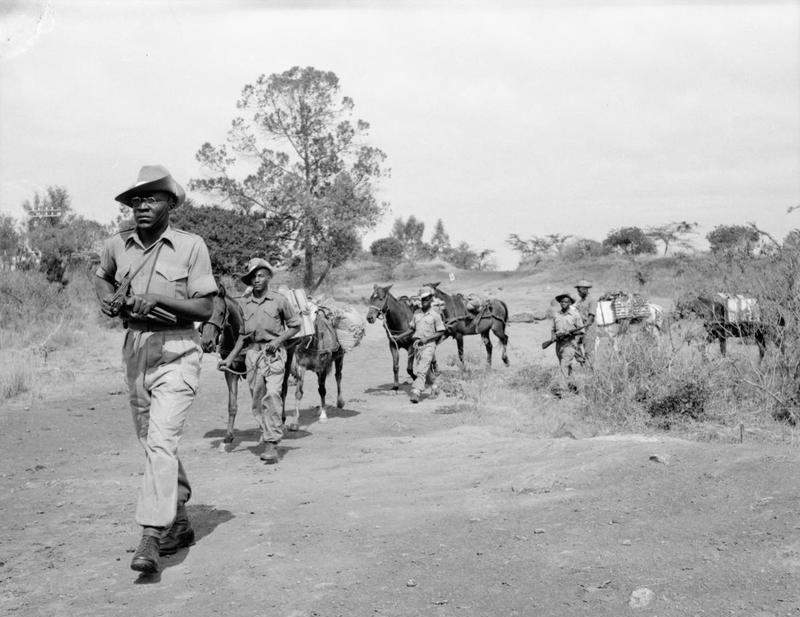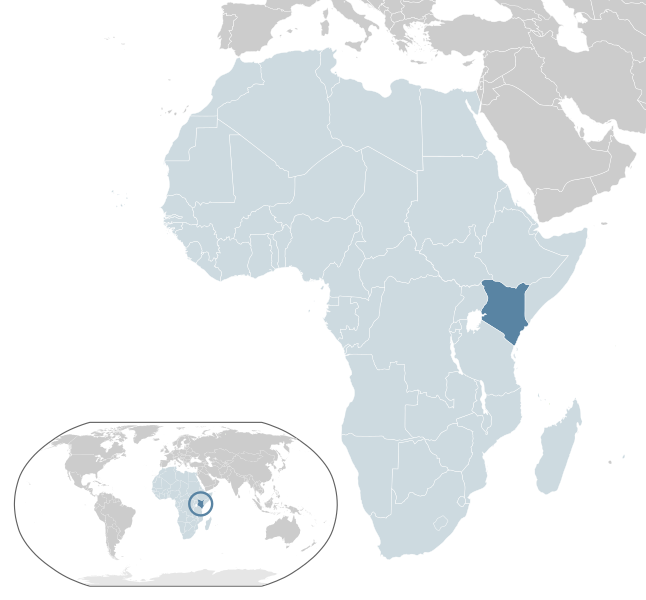The Mau Mau Uprising in Kenya (1952-1960)

Troops protecting supplies against the Mau Mau Rebels. (Public Domain photo. Info can be found here)
The Mau Mau Uprising was a huge guerrilla warfare rebellion by the Kenyan Land and Freedom Army (KLFA). The name of the uprising is not connected to the group KLFA, but is instead intended to mean “freedom.” This name would be used by the British in a mocking way during this war as a way to make the people look less civilized though. Like many of these wars, this one started with a boycott based on the treatment of workers in specific trade crafts. These groups would united to shut down Kairobi for 9 days in protest of their treatment. They did have some solid grievances, since Africans had no rights or representation in their legislature, but the British had allowed Arabs and Asians in the country to have both. These issues led to an oath that the leaders would take to promise that they wouldn’t end this strike until they achieved their goals. Unfortunately, for them, they decided to seal this oath with an animal sacrifice, which the British used as negative propaganda to make them look like “savages.”
When the peaceful boycott was unable to achieve the goals of the group they moved to more violent means of fighting this. These groups eventually turned into guerrilla groups and would clash with the police in an effort to protect the people from the police. Like most rebel groups they did not stop with the attacks on government officials though; the rebel groups often would kill those Kenyans who worked with the government as collaborators also. These
‘traitors’ to the movement were often murdered in broad daylight for their actions. The British responded to this by bringing in thousands of troops to stop these movements in 1952. They suspended habeas corpus (the right to a fair trial) and arrested the leadership and important people from the movements. Most of the rest of the rebels would run to the forest to hide, but the British were able to arrest 8,000 people in the 1st month of the operation.
The rebels, of course, weren’t the only ones who were being excessively violent in fighting these battles. British soldiers were allowed great flexibility in ways they could stop the violence. Soldiers ended taking this way too far and caused more of the local Kenyans to join the rebel cause. It was not uncommon for officers to stop random people with no cause and then shoot them if they didn’t follow everything the soldier said. It got to the point where the soldiers started collecting human hands for a bounty (5 shillings), which was done so that people couldn’t use the fingerprints to identify the people. As these actions worsened the British would start to keep score of the killings like it was a sporting event.
Once people were arrested, whether actually guilty or not, they were taken to concentration camps to hold them. As you would expect, these camps became horrific in terms of the treatment of the people. The international community didn’t know how bad these camps were because the British tried to hide this from them on purpose. The British did, however, highlight every single event in which one of their soldiers were killed in an attempt to use this as propaganda against the rebels. At the same time, however, the British were making a habit of burning down whole villages and killing all of the people who lived there.
All of the above tactics worked in the end, since the tactic that really worked was simply cutting off supplies that rebels used to attack with. Without supplies there was very little the rebels could do, and the British would invade the forces and take the last of the rebels out. The official numbers of deaths were between 11,500 and 20,000 Kenyans killed and 32 Europeans killed, however, some speculate that these numbers are deliberately low. There are historians who claim that up to 70,000 Kenyans were killed.
While this uprising failed to get independence, it would inspire later generations all over Africa to do the same thing in their countries. So, despite it being a loss, it became one of the most important events in the history of Africa and led to the independence of millions of people. This war also made the British realize that if they don’t make changes they are doomed, so they made a handful of changes in an effort to relax some of the tougher laws. This included the start of elections in Kenya, which was a huge deal.

The location of Kenya. (Public Domain photo. Info can be found here)
